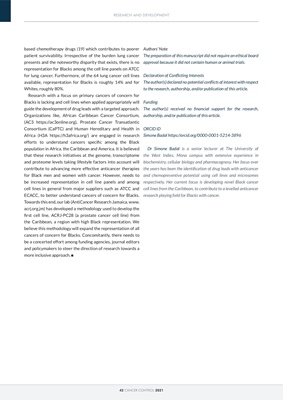
RESEARCH AND DEVELOPMENT
42 CANCER CONTROL 2021
Authors' Note
The preparation of this manuscript did not require an ethical board
approval because it did not contain human or animal trials.
Declaration of Conflicting Interests
The author(s) declared no potential conflicts of interest with respect
to the research, authorship, and/or publication of this article.
Funding
The author(s) received no financial support for the research,
authorship, and/or publication of this article.
ORCID iD
Simone Badal https://orcid.org/0000-0001-5214-3896
Dr Simone Badal is a senior lecturer at The University of
the West Indies, Mona campus with extensive experience in
biochemistry, cellular biology and pharmacognosy. Her focus over
the years has been the identification of drug leads with anticancer
and chemopreventive potential using cell lines and microsomes
respectively. Her current focus is developing novel Black cancer
cell lines from the Caribbean, to contribute to a levelled anticancer
research playing field for Blacks with cancer.
based chemotherapy drugs (19) which contributes to poorer
patient survivability. Irrespective of the burden lung cancer
presents and the noteworthy disparity that exists, there is no
representation for Blacks among the cell line panels on ATCC
for lung cancer. Furthermore, of the 64 lung cancer cell lines
available, representation for Blacks is roughly 14% and for
Whites, roughly 80%.
Research with a focus on primary cancers of concern for
Blacks is lacking and cell lines when applied appropriately will
guide the development of drug leads with a targeted approach.
Organizations like, African Caribbean Cancer Consortium,
(AC3 https://ac3online.org), Prostate Cancer Transatlantic
Consortium (CaPTC) and Human Hereditary and Health in
Africa (H3A https://h3africa.org/) are engaged in research
efforts to understand cancers specific among the Black
population in Africa, the Caribbean and America. It is believed
that these research initiatives at the genome, transcriptome
and proteome levels taking lifestyle factors into account will
contribute to advancing more effective anticancer therapies
for Black men and women with cancer. However, needs to
be increased representation in cell line panels and among
cell lines in general from major suppliers such as ATCC and
ECACC, to better understand cancers of concern for Blacks.
Towards this end, our lab (AntiCancer Research Jamaica, www.
acrj.org.jm) has developed a methodology used to develop the
first cell line, ACRJ-PC28 (a prostate cancer cell line) from
the Caribbean, a region with high Black representation. We
believe this methodology will expand the representation of all
cancers of concern for Blacks. Concomitantly, there needs to
be a concerted effort among funding agencies, journal editors
and policymakers to steer the direction of research towards a
more inclusive approach. n